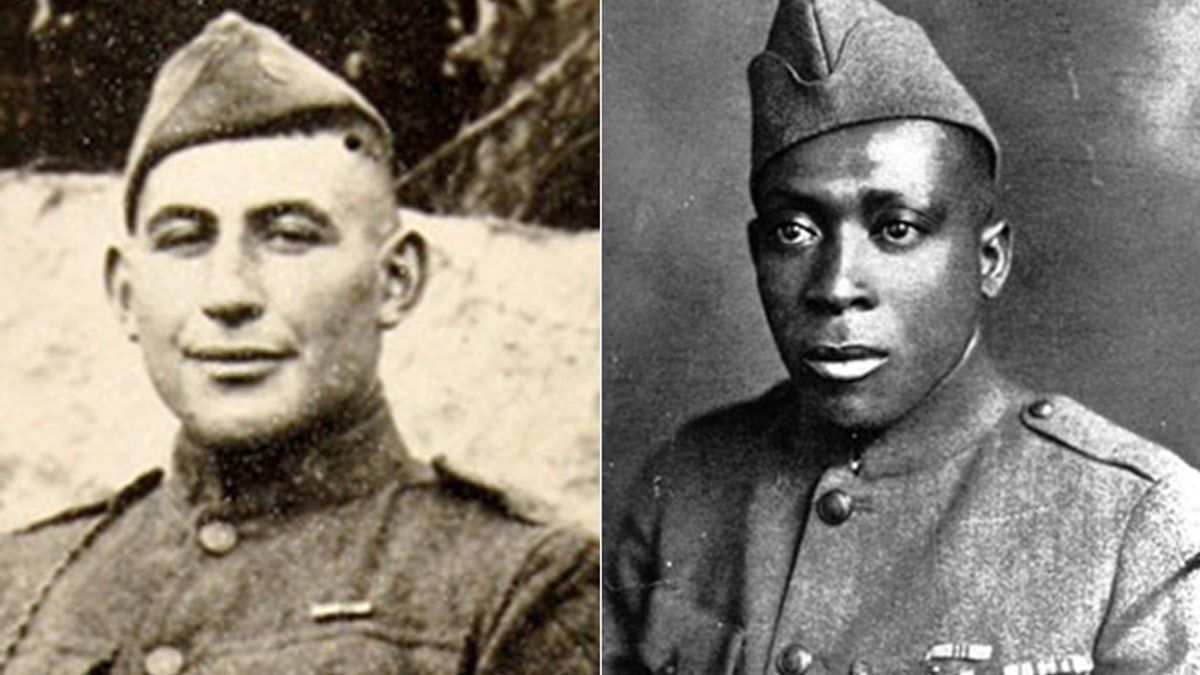
William Shemin, (l.) and Henry Johnson, (r.), are set to be posthumously awarded the Medal of Honor. (Shemin photo courtesy of family; Johnson photo courtesy U.S. Army)
As night fell, U.S. Army Sgt. Henry Johnson found his observation post near Sainte-Menehould, France under siege by a dozen German soldiers.
“With the most utter disregard for his own safety, (Shemin) sprang from his position in his platoon trench, dashed out across the open in full sight of the Germans, who opened and maintained a furious burst of machine gun and rifle fire.”
He fought them off until he ran out of ammunition, then used his rifle as a club, before taking on the rest hand-to-hand, with his bolo knife, eventually sending the enemy troops fleeing. Help didn't arrive until morning, on May 16, 1918, when Johnson, a member of the all-black "Harlem Hellfighters" 369th Infantry Regiment, was found badly wounded and near death. Just 21 at the time, Johnson would survive another decade before succumbing to alcoholism, broke and estranged from his family, in an Illinois veteran's hospital.
On June 2, Johnson will be recognized by President Obama with the Medal of Honor, nation's highest military award. Honored along with Johnson will be Sgt. William Shemin, a Jewish soldier who bolted from his platoon's trench and ran into heavy enemy fire to save a wounded comrade. The White House ceremony is part of an ongoing effort to honor soldiers who may have been passed over due to race or religion.
For years, Johnson's relatives, veterans and Sen. Chuck Schumer, D-N.Y., have been pressing the case for Johnson, who also prevented badly injured fellow soldier Needham Roberts from being taken prisoner. Although Johnson was initially celebrated for his incredible bravery, receiving the Croix de Guerre with Gold Palm, one of the French military's highest honors, he faced racial discrimination upon his return to the U.S. and struggled with alcoholism, according to an account from the book "Torchbearers of Democracy: African American Soldiers in the World War I Era."
A similar campaign has long been in the works to award the Medal of Honor to Shemin. On Aug. 7, 1918, Shemin raced from the trench near Bazoches, France, and braved heavy fire in the open to rescue wounded comrades. In the ensuing hours and days, the 19-year-old soldier from New York took command of the platoon following the deaths of superior officers. He was shot in the head Aug. 9, but survived.
“With the most utter disregard for his own safety, [Shemin] sprang from his position in his platoon trench, dashed out across the open in full sight of the Germans, who opened and maintained a furious burst of machine gun and rifle fire,” according to one of Shemin’s superiors, Capt. Rupert Purdon, who later wrote in support of a Medal of Honor.
Shemin was awarded the Distinguished Service Cross, the nation’s second-highest military honor, but there was never an explanation of why he was denied the Medal of Honor. Shemin later earned a degree from Syracuse and started a greenhouse and nursery business in the Bronx. He died in 1973.
Shemin's daughter, Elsie Shemin-Roth, who was involved in the campaign to honor Shemin's actions, will accept the medal on his behalf. Awarded personally be the presidemt, it was created in 1861 to recognize men who distinguished themselves "conspicuously by gallantry and intrepidity" in combat. There have been 3,469 Medals of Honor awarded to date, with the largest percentage given to veterans of the Civil War.









































